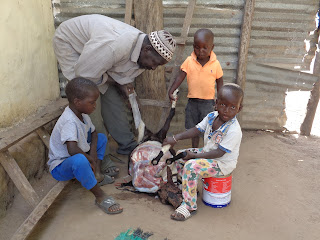Let the Planting Begin!
We are officially in the "cold" season now. Yesterday it didn't even reach 90 degrees! Eighty-eight was the high I believe, although it's forecasted to return to the 90s tomorrow. It is also the dry season (~ Nov thru May/June) and a time when there is a 2-3 month lull in intensive work on commodity crops. We just wrapped up the groundnut harvest in Dec and it will be a month or two before the cashew fruits ripen. This is the time of year when the weather and seasonal cycles of farm work are most conducive to gardening.
Gardens are most commonly the women's projects but not exclusively. Gardens provide nutritious food for the food bowl and hopefully produce enough surplus to sell locally, either in village or at the closest market. There are two weekly pop-up markets, or "lumos" within a few kilometers of my village - a small one to the east on Tuesday and larger one to the west on Saturday.
But there are significant hurdles that must be overcome to have a successful garden. Most critical is fencing. Most family compounds have a few goats and/or sheep and some also have cows. During the rainy season these animals are required to be tied up or otherwise controlled to prevent damage to the commodity crops such as millet (aka coos), groundnuts, maize, sorghum, rice and a few others. Once the crops are beyond the vulnerable stage the livestock are set free to forage until the next rainy season. This means they are free to roam during the gardening season. If a garden fence - be it wire, cement block, dead or live vegetation - has an opening, the animals will find their way into it and invite all their friends along. And that means no fresh veggies for the food bowl.
Water is anther challenge. While some villages have bore holes with solar-powered pumps to ease the chore of fetching water, my village and many others do not. My village has one source of potable water - a covered well with a hand-opearated pump - and a number of open wells scattered throughout the village that provide water for washing and livestock watering. Gardens typically require watering twice a day given the heat and sandy soils. That means pumping or pulling up water from the open well and hauling it by the bucket full to your garden twice a day for several months. Water taps and hoses are not part of the equation here. It's a lot of work, especially if your garden is not right next to the well.
My village has a large women's garden that was very successful for a few years but the fence fell into disrepair and they cannot use it until the fence is fixed. I am hoping I can help them with that while I'm here. In the meantime, I was happy to find out that the K-6 school in my village has a garden that has a relatively intact fence, and that they were just getting started with their planting.
I joined them on Friday when they had all the students out preparing the beds, planting seeds and tranplanting onion starts. Each plot is assigned 2-3 children who are responsible for watering it every school day, with a rotating assignment for the weekends. I'm excited to get my hands dirty with them and learn about gardening in The Gambia. We're growing onion, cabbage, tomatoes, lettuce, okra, cucumber and eggplant. I'll let you know how it goes!







ENGINEERING PARTS FOR CONSTRUCTION MINING OILFIELD
ReplyDeleteNon OEM engineering parts for construction-mining-oilfield hydraulic hammer rock breakers of Epiroc, Rammer, Furukawa, DNB, Atlas Copco, MTB, Krupp, Sandvik, MSB, Allied, Kent, Montabert, Daemo, Bretec, Steck, Hanwoo, Chicago Pneumatic, Kwanglim, Tramac, Fine, Vega, Komatsu, Soosan, Topa, Toku, DandA, etc.
Rock Breaker Hydraulic Hammer
Email: meritautomotive@gmail.com
Merit Automotive Mining Construction Oil Gas Field Plant Equipment Parts